FARHAD QAUMI emerged prison-hardened onto the streets of Auburn.
Before, he’d been just another Union Road thug, the kind who threw bricks at passing police cars. Now he’d put on size and carried a gun wherever he went. He sported a black mullet down to his shoulder blades and there were rumours that he’d killed a man who’d recently gone missing.
Friends described him as hot-headed and paranoid, quick to anger over trivial matters.
Ali Mobayad, a religious outreach worker, found himself on the receiving end of Qaumi’s explosive temper on the afternoon of March 29, 2006. Qaumi pulled up alongside him and cocked a gun beneath the window of his car.
He wanted to know why the preacher was always driving past his house on Blaxcell Street, Granville.
“Tell me bro,” he said, the weapon in his hand, “Are you driving past my house ‘cause you’re after me?”
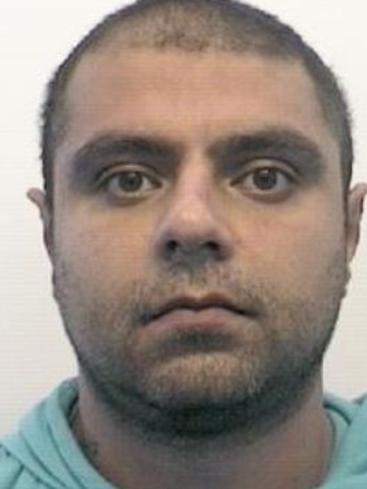
That night Mobayad relayed the story to his close friends Bassam Chami and Ibrahim Assad, but pleaded with them not to intervene. Chami was a professional boxer; both had been to prison. They wanted to pay Qaumi a little visit.
“Give me his number,” Assad said.
Neighbours living on Blaxcell Street became witnesses to what followed. A woman putting her kids to bed heard some men arguing outside the Qaumi home. A lady making coffee heard five gunshots. Chami’s body lay lifeless in the middle of the road.
A witness later told police he saw the other man, Assad, running from Qaumi. When paramedics arrived they found him on a front lawn, sweaty and pale, reciting Koranic passages in Arabic.
“Am I going to die?” he asked in the ambulance.
“Mate, I’m not going to lie to you,” a paramedic said. “You’ve taken two to the chest. It’s pretty serious.”
“Oh my God,” he whispered. He was dead within hours.
Forensic officers worked the scene around Chami’s body, his injuries telling the story of what had happened. There was a bullet wound at the base of his skull, suggesting his back was turned when he was shot. A fine black powder left around the wound indicated the barrel was pressing into his skin, meaning an execution-style murder. Even for Auburn, there was something dead-eyed and sociopathic about the crime.
By the time detectives started looking for Qaumi he was already halfway to his girlfriend’s apartment at Brighton Le-Sands. Clair Flitton, 29, told people she ran a graphic design business, but really she was an escort.
They grabbed some clothes, pulled $400 from her bank account and started driving to Perth, sleeping in their car or the occasional roadside motel. Qaumi cut off his mullet and dyed his hair blond.

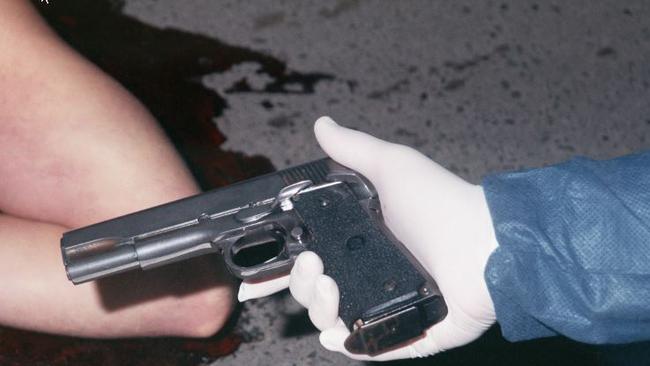
They used fake names to rent an apartment on arrival and buy new SIM cards. Flitton hired a room at a cheap hotel and went to work as a prostitute, charging clients $250 for the hour under the name “Electra”. Qaumi spent his days watching DVDs like The Sopranos, Wolf Creek and Carlito’s Way. He also watched a kids’ movie called Herbie Fully Loaded and Madagascar, a cartoon about a zebra called Marty who pulls off a successful zoo escape and learns to live in the wild surrounded by predators.
This idyll was broken six weeks later when detectives burst into Flitton’s rented hotel room and placed her under arrest — her phone calls back to Sydney had given away her location, Qaumi’s too; he was taken down by a tactical team in the hallway outside their apartment. They had cleared the floor expecting a gunfight, but Qaumi emerged with his hands up and said: “Don’t shoot me,” at the sight of their weapons.
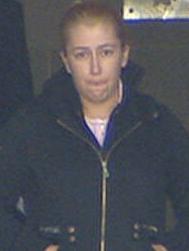
He spent the next three years in prison awaiting trial, preparing to fight the charges, using his aggression to do more surviving. He threw boiling water through his cell door to fend off enemies. One day he attacked a former police officer, who was inside for paedophile offences, trapping the man’s arm as he passed a lighter between their cells and cutting it up with a jail-made shiv.
Guards noted his passing remarks. “I’m not like them,” he said of the other inmates. “They shoot from their cars, they don’t have the heart like me to do it up front.”
At his trial for the Blaxcell Street shootings, Qaumi pleaded not guilty, using a self-defence argument, testifying that he’d shot Chami and Assad because they had threatened him and had fearsome reputations. A lot was made of the fact that Chami had come armed to the meeting.
But prosecutors remained confident of a victory. The gun pulled from Chami’s body had been wrapped in a tea towel and tucked into his hip. The safety catch was on and the position of his hands suggested he couldn’t have been reaching for it when he was shot: one hand was deep in his back pocket, the other was jammed beneath his chest on the ground.
On September 4, 2009, the jury delivered verdicts against Qaumi of not guilty on all charges, devastating the officers who’d worked the case.
From then on, people called him “The Afghan”, the killer who’d beaten the justice system.
Every detective in Sydney wanted to make their career by locking him up.
In the spring of 2011, a seasoned investigator named Justin Harris took a transfer to the detectives’ office of Flemington Local Area Command. One of Harris’ first assignments was to review an old case file that had been unsolved since 2005: the disappearance of a Turkish drug dealer named Cengiz Sarac.
Sarac was not an endearing character; he hit women and had once shot off his own testicle trying to fit a gun down his pants. He was 24 at the time he disappeared, just a few months after Qaumi first got out of prison on his gun charges.
As Harris leafed through the Sarac file, he read through countless intelligence reports riffing on the same version of what happened: informants had told police that Qaumi had abducted Sarac, shot him and either dumped his body in nearby Duck Creek, or buried him in the concrete foundations of a house at Merrylands.
This was telling, but not a smoking gun. But Harris immediately noticed deficiencies in the original investigation. For starters, the Merrylands property had never been dug up and checked for a body. Other leads on Qaumi had never been followed either.
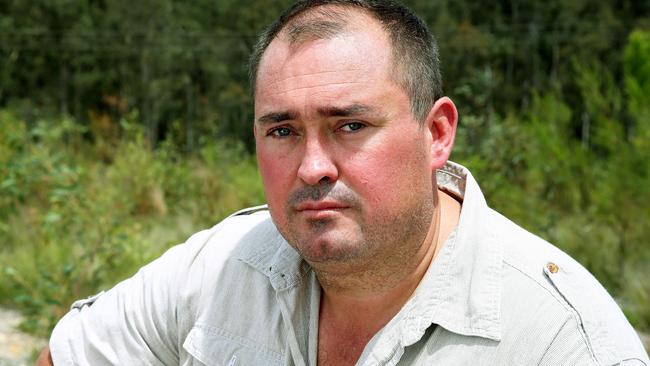
Working alone, Harris lobbied his bosses to reopen a strike force investigation so he could have another crack at Qaumi. He succeeded, and soon after had a listening device planted in Qaumi’s Chittaway Bay home. Qaumi had moved there after his murder acquittals, telling people house prices in Sydney were terrible; but there were also people wanting him dead around Auburn.
Journalists were invited to film search teams wading through Duck Creek, and the house where Sarac was reportedly buried was dug up with heavy machinery, creating a field day for television news cameras. Bones were discovered but tests would show they were animal, not human.
Qaumi watched it all on TV and was soon bringing up the Sarac case in his phone calls. Harris listened and waited for him to say something incriminating.
I f***kin’ grabbed him and I just went bang”
“You know that thing on the news today,” Qaumi said in one phone call that grabbed Harris’ attention. “I fuckin’ grabbed him and I just went bang, I headbutted him and I busted his nose … We jumped in a car, I pulled out a gun, put it back in and I followed to [another person’s] house, his little brother was saying: ‘Please boys not out the front of my house.’”
Harris was stunned — the call sounded like an admission. He took it to prosecutors along with the statement of a new informant prepared, after much convincing, to get in the witness box. By April 2012, the detective watched as a tactical team cleared Qaumi’s property in Chittaway Bay and brought him out in handcuffs. At Wyong Police Station he laid charges over the unsolved murder of Cengiz Sarac.
In prison, Qaumi waited to view the case against him, confident of another stitch-up. When the folders arrived he bragged to his brother Mumtaz that he would soon be free.
“The case is weak,” he said. “They are just making up lies against me.”
But between these jail phone calls it became apparent that Qaumi had become acquainted with one of Supermax’s most notorious inmates, Bassam Hamzy, founder of the Brothers For Life street gang and a man with extraordinary reach outside of prison.
This was the same Hamzy who’d organised two kidnappings from his prison cell using a smuggled phone; the same Hamzy who tried to kill his own brother for undercutting him in a drug deal; the same Hamzy who spoke of cutting people’s spinal cords and pouring acid in their eyes.
This was also the same Hamzy who felt his Muslim-dominated street gang, which he’d started from scratch, was losing its focus under the not-so-steady hand of his cousin, Mohammed Hamzy. Its fundamentalist edge was being abraded by partying and drugs, Bassam felt.
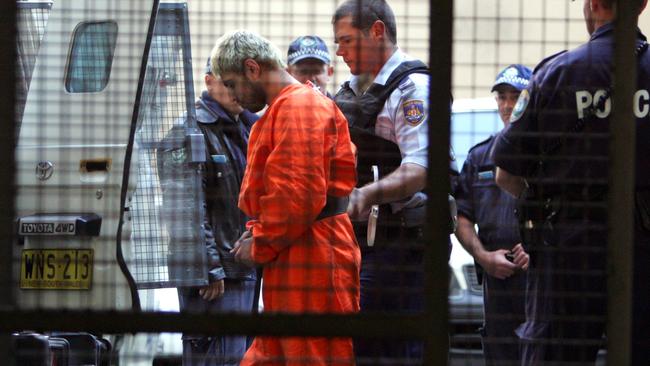
“The case is weak. They are just making up lies against me.”
In Qaumi, he saw a man who prayed daily, spoke of jihadist ambitions and was a worthy protégé for recruitment to the BFL. He was becoming annoyed with ‘Little Crazy’, as cousin Mohammed was known. Friends called him ‘LC’ for short.
But even Bassam Hamzy couldn’t anticipate what Qaumi had in mind when he joined his BFL gang.
“You have to use your brain,” Qaumi said to Mumtaz as they spoke about infiltrating the group and eventually taking over.
“Chess, remember, it is chess brother,” he said.
Qaumi’s predictions about Sarac case eventually turned out to be correct. An administrative error brought it all undone: overworked and exhausted, Detective Harris accidentally sent sensitive paperwork directly to Qaumi. Not long afterwards his informant started changing his story.
A single phone call wasn’t enough to hold up a murder charge, and a judge threw the case out during committal hearings.
Harris left the force a few months later, and Qaumi’s record for murder stayed clean.
In the video at the top of the page: Farhad Qaumi (”Me paranoid?”) is heard talking to rival gangster Mohammed ‘Little Crazy’ Hamzy, July 2013. Video: Police arresting Jamil Qaumi in Sydney, November 2013.
Chapter 1: From refugee to super villain
Chapter 2: A killer on the run
Chapter 3: The killer's credo - Make men afraid
Chapter 5: When Sydney was a battlefield

Deer in the headlights or really good cop? Who is Karen Webb
Karen Webb has become our most divisive public servant since she was appointed NSW’s first female Police Commissioner in 2021. With her exit from the job looming, here’s the inside story of her time in the role.
Everyday heroes: Regional NSW residents land Oz Day honours
Not all heroes wear capes – and it couldn’t be more true for these everyday champions from Regional New South Wales who have been honoured this Australia Day. See the full list.